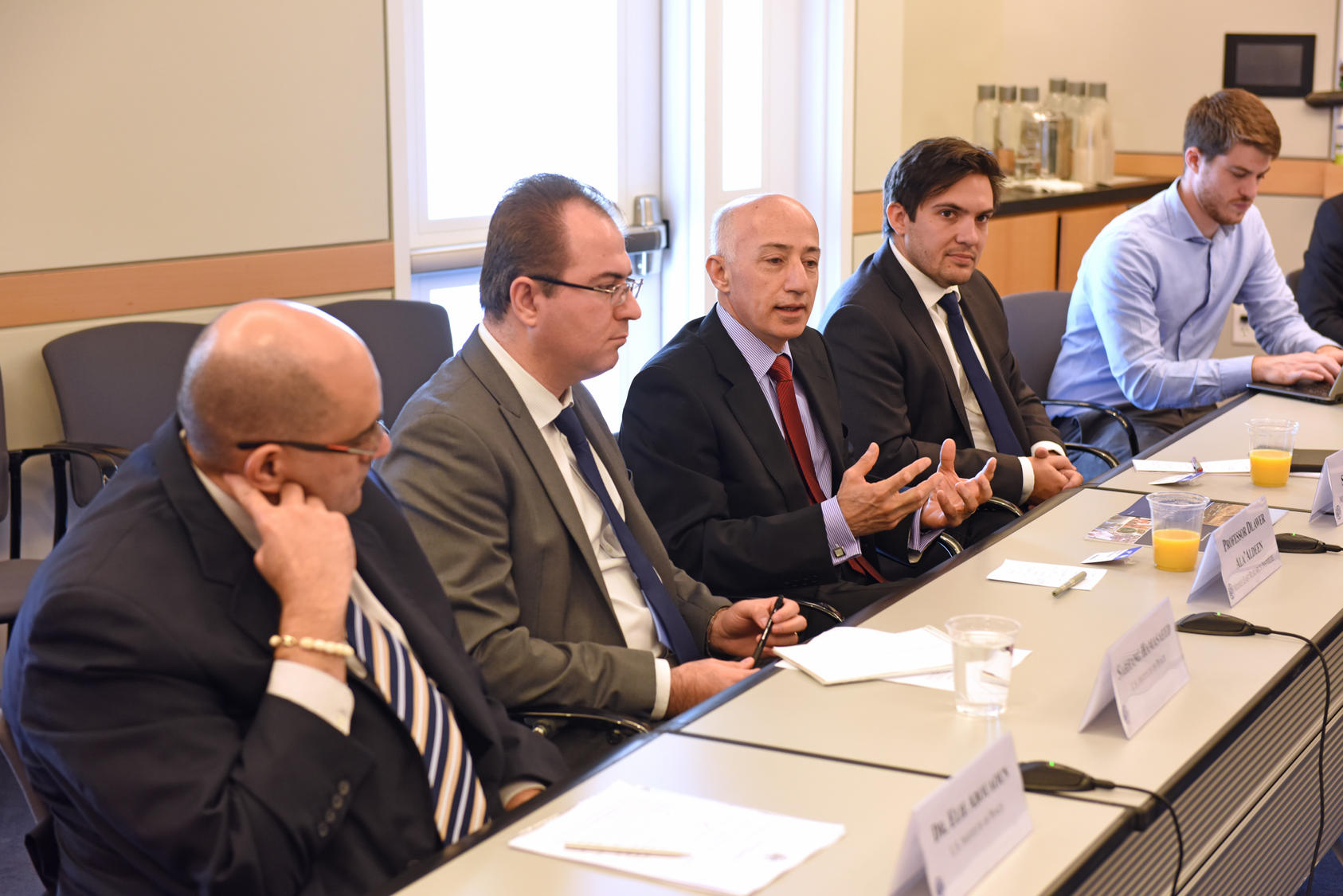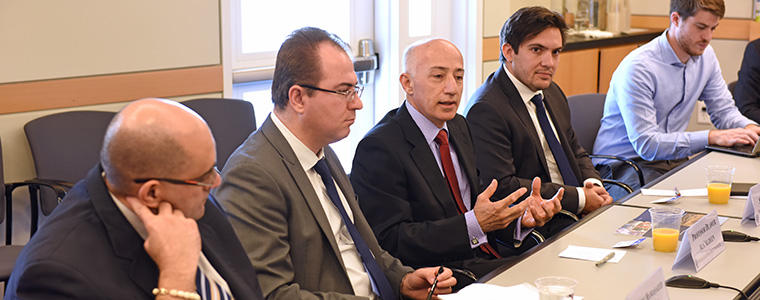Iraq’s Kurdish region, which has been crucial for containing the Islamic State’s rampage and sheltering Iraqis fleeing the extremist group’s brutalities, urgently needs greater engagement from the U.S. and Europe, a panel of experts said in a discussion hosted by the U.S. Institute of Peace. Only intensified support will enable the region to withstand the multiple shocks of the past year, including its own current political crisis.

The autonomous region’s political tumult, exacerbated by deep economic stresses from the Islamic State menace and the past year’s plunge in oil prices, comes at a time when Iraqi, U.S. and other forces are relying on the Kurdish Peshmerga as the most effective ground troops in combating the Islamic State. Iraqi Kurdistan also is caring for some 1.5 million Iraqis who’ve fled communities taken over by the self-styled “Islamic State” group, and for 275,000 refugees from the Syrian war.
In the absence of strong U.S. and European leadership on Iraq, regional powers such as Turkey, Saudi Arabia and Iran are exploiting the vacuum and trying to shape outcomes. -- Dlawer Ala’Aldeen, president, Middle East Research Institute.
A collapse of democratic order in Iraqi Kurdistan would add to the instability of the broader Middle East, which already has been roiled again recently with Russia’s militarily intervention in Syria to bolster President Bashar al-Assad. Other previously stable areas of the region also are under the threat of violence and political turmoil, including widespread and persistent protests in southern Iraq, the specter of a third intifada in Israel and the Palestinian territories, and the rapidly accelerating upheaval in Turkey.
“Left alone, we can’t do it,” said Dlawer Ala’Aldeen, president of the Middle East Research Institute, an independent think tank based in the Kurdish regional capital Erbil, said in the Oct. 14 discussion. “Left alone, Iraq has failed to sort Iraq out. Left alone, Kurds may well fail to sort it out because it’s complex. Left alone, Syria would not sort itself out, and Turkey would not sort itself out.”
Areas of the Middle East that had been stable are “destabilizing for various reasons, and for peacebuilders in the region the landscape has [become] more complex,” Sarhang Hamasaeed, a senior program officer for the Middle East and North Africa at USIP, said at the invitation-only event.
Kurdish leaders in Iraq particularly need political capacity building to further develop skills needed to negotiate sensitive impasses such as the one facing the regional government now, said Ala’Aldeen, who served as a minister for higher education in the Kurdish Regional Government from 2009 to 2012.
The region has held free elections since 1992, and political parties have managed to form coalitions and rule democratically for the past 10 years, he said. But the current crisis is stretching the capabilities of still-nascent democratic structures, said Ala’Aldeen, whose new research group is funded through a grant from the Kurdish Regional Council for Oil and Gas Affairs.
Impasse Over Presidency
The impasse arose as a result of a dispute over the region’s presidency. The tenure of Massoud Barzani, who has held the office for two four-year terms and a two-year extension, expired in August, but elections continue to be postponed as a result of disagreements between his Kurdistan Democratic Party (KDP) and others over the role of the presidency and how it should be filled.
The KDP has resisted demands by other Kurdish parties, including the two main opposition parties, the Patriotic Union of Kurdistan (PUK) and Gorran (Change), to make changes in the office of the presidency. The tensions have led to demonstrations, Cabinet dismissals and attacks on party offices. The tumult has raised fears that the region would slide back into the violence of the 1990s or, at the very least, split the region’s government again into two administrations, as during the period between 1996 and 2006.
The U.S. could use its leverage – Kurdish leaders are seeking more American weapons and supplies for their Peshmerga forces -- to encourage a furtherance of democratic processes, Ala’Aldeen said. The U.S. could insist, for example, that the regional government establish institutional authority over the force, which currently remains divided based on control by the region’s two main political parties, the KDP and the PUK, he said.
In the absence of strong U.S. and European leadership on Iraq, regional powers such as Turkey, Saudi Arabia and Iran are exploiting the vacuum and trying to shape outcomes, Ala’Aldeen said. Because those regional powers are either unwilling or unable to promote democratic institutions in Iraq, the results could be devastating.
“They’re tearing the place apart,” Ala’Aldeen said. “We as a small nation, as an emerging nation, inevitably will either fall victim [to] the rivalry or we become part of it,” he said, referring to the Kurdish region, which has long had aspirations of ultimately seeking independence from Iraq. Massoud Barzani, on a visit to Washington in May, told a joint USIP and Atlantic Council audience that the pursuit of independence must wait until the fight against the Islamic State group has been won.
Thinking Beyond Military Campaigns
A superpower like the U.S. that’s seriously interested in peace for the Middle East should be more engaged, rather than leave the management of such affairs to regional powers, Ala’Aldeen said.
The U.S. involvement should go beyond military intervention to more diplomatic contributions because, without a stable Kurdish region and its Peshmerga forces, the American goal of degrading and defeating the Islamic State may not be achievable, said Samuel Harris, a research fellow at the Middle East institute who also took part in the discussion.
Elie Abouaoun, director of Middle East programs at USIP, said the overwhelming emphasis by the U.S. and regional powers on military efforts could lead to more violence as weapons proliferate and fighting and displacement intensify battles over territory, whether between Sunnis and Shia or with some of the minorities whose communities have been decimated. The result will only spread violence further, he said.
“One thing that [USIP has] always raised as a concern is the increased militarization of communities in Iraq, and we think this will be one of the biggest threats that Iraq will face in the near future,” Abouaoun said. “We think this should be a priority for the international community.”
Still, calls from the Middle East for greater U.S. engagement in the region must be seen in the context of the last decade, when many countries wanted less American involvement, especially in internal political matters of countries, Abouaoun said.
“We really need to be careful” in how any newly expanded political, diplomatic or other assistance by the U.S. would be designed, he said. The focus should be on building the capacities of local political actors to resolve differences themselves. The larger powers also must understand that, while some in the Middle East are working to bridge hundreds of years of sectarian, ethnic and linguistic divides, they remain in the minority, and any effort to nurture a resolution of these conflicts must take into account the reality of identity-based politics, he said.
Watch the entire discussion:
